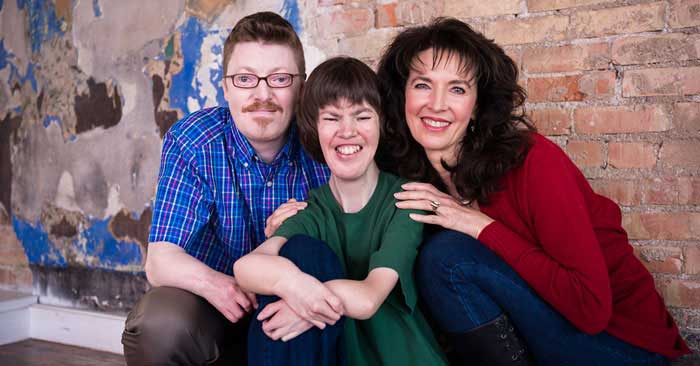
Do you face conflicts due to miscommunication? It’s not surprising that many people do. Using helpful tools to communicate more clearly can improve your skills. In the recorded video talks below, you will find that using the best communication tools help relationships and autism.
Our talks are titled, Communication Tools Gained Through Experiences with Autism. I also included a summary of the tools here.
With Autism Comes the Importance of Using Clear Communication
As a hairstylist for 40 years, I learned communication skills early on. However, when doctors informed our family that my two adult children, Heather and Logan have autism, we also learned the importance of using clear communication.
As a result, I learned and used some of the best communication skills I’ve ever used, which assists Heather and Logan, and other family members to understand me better. Consequently, my other important relationships improved as well by using effective communication skills.
You don’t have to be dealing with someone with autism to benefit from learning and using better communication skills. ~Debbie Jorde
Using the Best Communication Tools Help Your Relationships and Autism
People who have autism take what you say literally so when you’re having a conversation with them, your communication must be clear. They also need more time to process the information they receive. Therefore you must learn to give them time to answer questions and think about topics of interest to them.
In other words, learn the skill of not interrupting other people when they’re talking.
Communication Tools Gained Through Experiences with Autism
Because I love to communicate with people and because the skills I learned helped me do this more successfully, I share them in a talk I give called, Communication Tools Gained Through Experiences with Autism.
Heather and Logan give talks sharing skills they’ve learned that help them communicate better. Also, they share their experiences about how having autism affects both understandings exactly what people mean when they’re talking and as well as when expressing themselves.
In the videos below, you can listen to our talks. In addition to the videos, I’m summarizing what I think are the best communication tools to help your relationships and autism
4 Important Skills that Help Create Clearer Communication
Four important steps can be taken to create better communication as listed below:
- Communicate more details.
- Speak more honestly.
- Be more direct.
- Allow time for the other person to process the information.
The AAA’s, Tools for Successful Communication
In my talk, I also present what I call The AAA’s, Tools for Successful Communication. They are, Awareness, Assessment, and Action. Using these skills make a dramatic difference in communicating clearly and producing richer, more rewarding relationships.
The Importance of Details and Non-Verbal Communication
In Heather’s talk, she speaks about the details that come into consideration when communicating clearly. She also includes how learning the meaning of non-verbal communication is important.
“Clear communication provides an absolute advantage in life. It produces self-empowerment, more accurate perspectives, and realistic expectations, which builds richer relationships.” ~Heather Madsen
Debbie
Heather
Logan
*Unfortunately, the video camera battery died before recording the end of Logan’s Talk. Therefore, the rest of his talk is below:
The text below is the rest of Logan’s Talk:
“Creating incorrect assumptions and expectations are the very things that produce the problems.”
“The result is similar to the one my mom describes…I don’t always know how I truly feel because I’ve been blocking my honest feelings from myself. This is why I feel I don’t know myself.
I can clearly see the importance of more honest, clear communication and realize I have a lot of work to do too. Now I realize that creating incorrect assumptions and expectations, to protect my ego, are the very things that produce the problems I need to be protected from.
“Using Awareness, Assessment, and Action can help us improve our communication and create a closer relationship.”
In response to mom’s story about the caulk…My biggest problem that night was OCD related. When I do things, I am very methodical and neat. Mom was making a big mess by moving my furniture and things without asking me or telling me what she’s doing around and sloppily applying the caulk with her fingers. I was going crazy!
Of course, the madder I got, the more mom ignored me, so I started yelling, and she tuned me out even more…and round and round we went. It’s this example of poor communication, and others, that contribute to the rift that she and I have had for a long time.Using Awareness, Assessment, and Action can help us improve our communication and create a closer relationship.
“Struggling with understanding context, interpretation of verbals and nonverbals and needing time to process.”
Heather mentioned struggling with understanding context, interpretation of verbals and nonverbals and needing time to process… Over the last couple of years, I’ve realized that I have the same issue.
We may differ in our struggles, but I know pretty well what mine are, how my immediate responses play out and what it does to me inside. So much that sharing that is beyond the scope of this talk. Suffice to say, trying to process while attempting a heartfelt response is SO overwhelming… it’s easier just not to care at the moment.
“What I really want is for you to know my overall honest and genuine sentiments.”
I am actually very sensitive of other people’s feelings. The autism wants to respond immediately, without filtering, sounding bluntly honest, rude and hurtful. Knowing I can’t be that direct, but needing to give a response to the question you just asked me: “Do you like this band?”…causes a war in my mind.
I want to tear you apart for putting me on the spot like that. “Why would you do that to me?!” That’s not what I mean, though. I need time to process it all. Obviously, this is just one stupid question…put it in with the rest of, what should be, a benign conversation and I’m ready to split in two from anxiety.
That’s not to say that I can’t be feeling and sensitive, I can. I just struggle piecing it all together and getting it out into a neurotypical world.
What I really want is for you to know my overall honest and genuine sentiments. While also learning to communicate my real feelings of anger and sadness and still feel accepted.
“I am giving myself time, space and permission to go at my own pace and work through my communication hurdles.”
So, I am giving myself time, space and permission to go at my own pace and work through my communication hurdles. I think knowing the tools we’ve talked about tonight can make all of our journeys a little bit easier.”~Logan Madsen
Learn more…
The 7 C’s of Communication: A Checklist for Clear Communication



